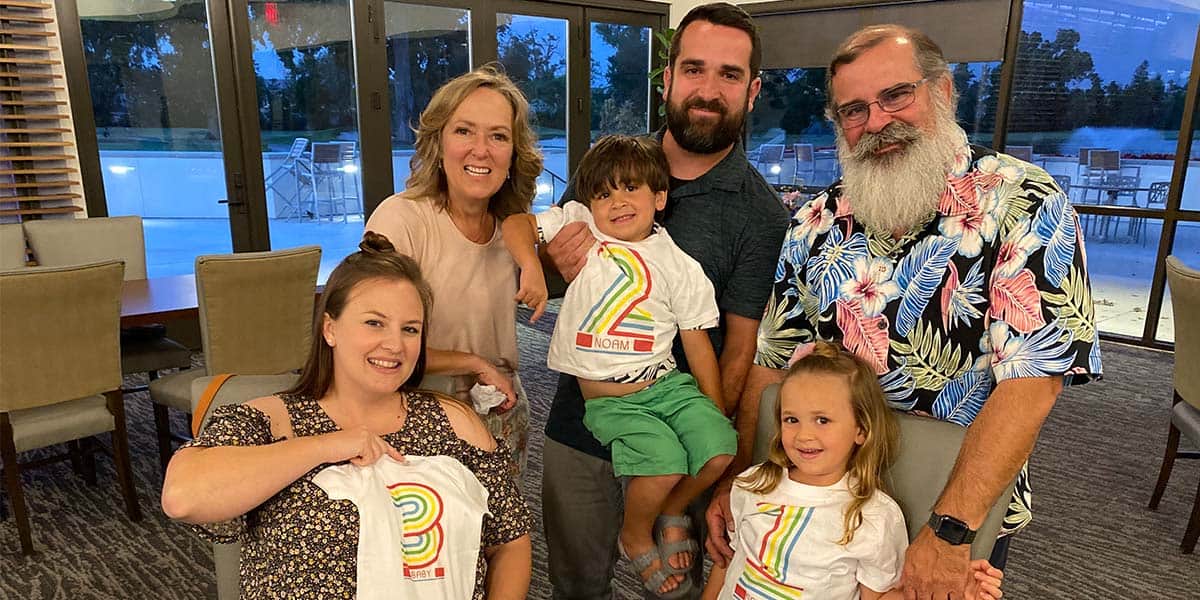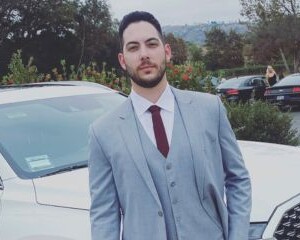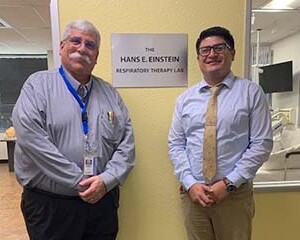Respiratory Therapist well prepared for Code Blue alerts in times of CoVid

In April 2019 when Josh Perry completed SJVC’s Respiratory Therapy program in Visalia, he envisioned a prestigious health care career treating patients with breathing problems, providing instruction on use of treatment devices and monitoring patient progress or decline. There was no way he could have anticipated the acceleration of his responsibilities and pervasive mortal threat that CoVid-19 would inject into his daily work routine.
“I look at my career in two chapters,” says Josh. “The first chapter was the stress of being a new Respiratory Therapist and applying everything we learned in school to real world application in the hospital. Just as I was finding comfort with figuring that out and being efficient in moving from patient-to-patient and floor-to-floor, CoVid happened. The second chapter is CoVid. You are saving lives in a whole new way. There are new challenges and uncertainties for all levels of expertise.”
Josh’s employer, Kaweah Delta District Hospital (KDDH), has met the virus head-on as it increases hospital, patient and staff safety measures, patient care protocol and space to handle high volume Emergency Room (ER) visits and hospital admissions.
“We’re feeling the second spike of CoVid,” says Josh. “Half the patients in ICU (Intensive Care Unit) are positive for CoVid.” Anyone coming to the Emergency Room who has symptoms of the virus, is housed in a tent set up outside. “They have to be processed before they even make it into the building.”
Virus identification and spread prevention are equally important. “KDDH has an investigative team in place to do (patient) home and work contact tracing, says Josh.” Medical staff who have direct CoVid patient contact are regularly tested either by nasal swab or an antibodies blood test. “Not everybody needs to get the CoVid test,” says Josh.
All hospital staff are on high alert to avoid contamination or undue exposure. “Everyone treats the floor like lava,” says Josh. “Nothing touches the floor. Power cables, oxygen tubing, IV lines are all elevated off the floor.”
Personal Protective Equipment (PPE) is standard hospital uniform for health care providers in ICU, Emergency Room and other areas restricted to CoVid suspected or positive patients. “If a patient is on BiPAP (Bilevel Positive Airway Pressure) or high-flow nasal canula – even if they are negative for the virus – we gown-up, just in case,” says Josh. “We’ve had a handful of patients we don’t suspect of being positive who later test positive.”
A consensus among staff has been silently reached: “We all act like we have it (virus) and give each other space,” says Josh. “From the moment you step onto the hospital property until you step off, we constantly err on the side of caution.”
That caution follows Josh home. His shoes never make it into the house from the garage. He strips to his underwear and his clothes go straight into the washer with temps on hot. The next step in his routine is a shower. “I shut my eyes tight and curl my lips and lean my head back to wash my hair,” says Josh. “I don’t let the water go down into my face, into my eyes, nose or mouth.” Hospital to home. Contaminated to safe. Josh will not even stop for gas on the way home or greet anyone before performing this safety ritual.
Along with hazardous particles, he lets his fears go down the drain, as well. Once home with his wife, Nyssa and children Savvy (6) and Noam (4), Josh releases his green ‘Hulk’ shell and is, once again, a loving, affectionate husband and father. “Because they are young, the decision Nyssa (who also works at KDDH as a speech pathologist) and I have made is to be loving, cuddling and hands-on with our children,” says Josh. “They are devoid of social interaction with their peers, so their mom and dad are basically the only source of love and interaction they have.” A new sibling will join Savvy and Noam next January that will expand their circle of love.
Then a new day starts and the battle on the frontlines of life-and-death struggles begins again. “The hardest part of being a Respiratory Therapist is a Code Blue,” says Josh. A Code Blue occurs when a patient stops breathing or their heart stops – or both.
“A Code Blue means ‘everybody within a certain radius come here now and save this person’s life’,” says Josh. “I’ve been to Code Blues where we’ve revived the person and I’ve been to Code Blues when we’ve lost the patient. Those exercises are incredibly intense. “I don’t feel the emotion, I’m tapping into my skill set, thinking about what I need to do in the moment and what I need to do after that.”
Since the coronavirus pandemic, visitors are not allowed in most hospital or urgent care environments, unless there are special circumstances to be considered. Family presence can provide both a comfort and an emotional challenge. “The hardest is when the family is just outside the room holding onto that last string of hope,” says Josh. “We may have been trying for two hours and have done everything we can before the family finally says ‘That’s enough. We’re ready to let them go.’” At that point, the medical team releases adrenaline fed action and calm resignation takes its place.
“In end-of-life cases Respiratory Therapists are the ones who step in and actually remove the endotracheal tube and turn off the ventilator,” says Josh. “We do it calmly, quietly and with a sense of compassion. We look at it as a service to the family.” Their focus is no longer on saving a life but releasing a life with dignity.
“We take a lot of pride in helping families to be with the patient for the last moments before they pass,” says Josh. “But to witness family grief…that’s when emotion comes flooding in. Sometimes, at those times, I have to go and find a little supply closet.”
Josh never saw himself in this type of career. “I used to be a pretty bad hypochondriac and just driving by a hospital would make me uncomfortable,” he says. “I feel completely different about healthcare now. Nyssa was my personal inspiration to become a Respiratory Therapist and told me I should look into it.”
Josh’s family started SJVC in 1977 and he has been around in the college’s later years to see its evolution. His own career interests took him in a different direction. Josh had been very content as a woodworker and cabinetmaker, but once their family started growing, Josh wanted a career with greater income potential. Nyssa’s nudge resurfaced. “Respiratory Therapy seemed like a cool job, he decided.”
He scored well on the placement test and after talking with a couple of program faculty it was starting to feel like a match. “The next thing I knew I was sitting there (in class) in my navy-blue scrubs,” he remembers.
“We were a big rainbow of different types of people in there,” says Josh. “Someone came from working at a pizza place, one had been a babysitter, someone else had been a stay-at-home mom; there were a few who just graduated from high school and a couple of recent divorcees looking for a new start in life.”
Different backgrounds, same goal: Career success in a field they could love.
The program was intense. “We helped each other study for upcoming exams and if somebody was really struggling, we asked staff for help,” says Josh. “We found out that the longer you wait to ask for help the harder it is to get your grade back up.” Just past the 30-years old mark, Josh had some wisdom to share with his fellow classmates, should they ask for his help.
The best part of the RT program for Josh was serving his clinical hours of externship in a variety of medical facilities contracted by the college. “As part of our training we had 250-plus clinical hours, job-shadowing in sleep labs, Level I trauma centers, hospitals and medical facilities with many specialties. The time that we students spend in clinical externship is priceless. You basically work 250-plus hours in medical facilities, hands-on with patients before you even go into a job interview.”
That big interview has long come and gone, and Josh is enjoying the results of his hard work. So is his family. “My wife dreamed of being home with the kids more and now she’s working 24-hours a week instead of 40.” Their shared dream is taking finer shape.
Josh’s perspective had shifted considerably in the last couple of years. “I think I grew up a little later and it took me a little while to really find my self-motivation,” he admits. “Looking back at how hard my dad (Mark) worked so that we could have a good life; I didn’t realize how much I appreciate what he did and the sacrifice he made for the rest of us until I was a husband, a father and now a Respiratory Therapist. My dad and my mom (Karolina) are a great inspiration.”
Now Josh begins a legacy that conveys a message of sacrifice and responsibility to his own children. “I want my kids to be able to look up to me and say, ‘My dad works at the hospital and saves lives!’”
A family tradition continues.
You might also like
More stories about
Request Information
All fields using an asterik (*) are required.


